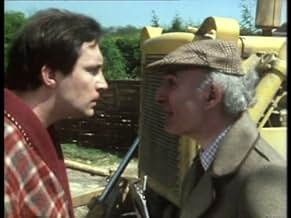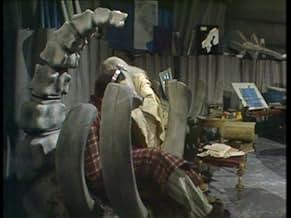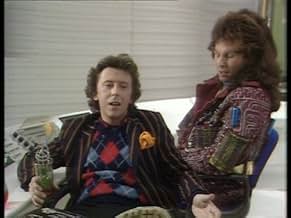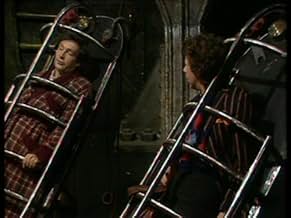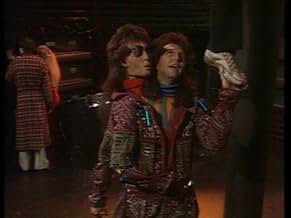O Guia do Mochileiro das Galáxias
Título original: The Hitch Hiker's Guide to the Galaxy
AVALIAÇÃO DA IMDb
8,0/10
12 mil
SUA AVALIAÇÃO
Arthur Dent e seu amigo Prefeito Ford escapam da destruição da Terra apenas para enfrentar incríveis provações, tribulações e aventuras no espaço e no tempo.Arthur Dent e seu amigo Prefeito Ford escapam da destruição da Terra apenas para enfrentar incríveis provações, tribulações e aventuras no espaço e no tempo.Arthur Dent e seu amigo Prefeito Ford escapam da destruição da Terra apenas para enfrentar incríveis provações, tribulações e aventuras no espaço e no tempo.
- Ganhou 3 prêmios BAFTA
- 5 vitórias no total
Explorar episódios
Avaliações em destaque
I've been into Douglas Adams' "Hitchhiker's Guide" series since grade school where it was introduced to me. So when I learned that I could have it presented to me in visual form, I was interested...just how could they adapt this novel, which strays every which way from the central story, into a mini-series of epic proportions?
Easy. As long as the Brits do it.
Get yourself a heard of young but experienced talent, who are no stranger to the airwaves in the UK, and stick close to the story. You're assured a winner. The book tells amazingly well on the screen, and the characters are pretty close to what your mind would imagine from descriptions in the text. Important points in the story occur when Adams strays from the main plot, and jumps into a description of the history of a certain object, person or event as described by the "Hitchhiker's Guide To The Galaxy", a futuristic electronic know-all dictionary. The mini takes this to heart so it seems, and sticks with it, showing viewers animated sequences to what the Guide would be showing it's user. This is where the film turns in it's most brilliant sequences.
Granted, some of the effects are cheesy, but for the time of the film (1981) and the budget of a mini, I say they did well. So Zaphod's second head is a motionless blob of plastic, with a moving mouth for about three sequences. The look, and attitude of Marvin the depressed robot is just fantastic and should be ranked up there with C-3P0 and Data as one of the greatest androids to appear on a screen.
The final word on this one is that once again, the BBC has put together another gem. It may scare you, being on two tapes and all, but it's worth a look. A genuine quality piece.
Easy. As long as the Brits do it.
Get yourself a heard of young but experienced talent, who are no stranger to the airwaves in the UK, and stick close to the story. You're assured a winner. The book tells amazingly well on the screen, and the characters are pretty close to what your mind would imagine from descriptions in the text. Important points in the story occur when Adams strays from the main plot, and jumps into a description of the history of a certain object, person or event as described by the "Hitchhiker's Guide To The Galaxy", a futuristic electronic know-all dictionary. The mini takes this to heart so it seems, and sticks with it, showing viewers animated sequences to what the Guide would be showing it's user. This is where the film turns in it's most brilliant sequences.
Granted, some of the effects are cheesy, but for the time of the film (1981) and the budget of a mini, I say they did well. So Zaphod's second head is a motionless blob of plastic, with a moving mouth for about three sequences. The look, and attitude of Marvin the depressed robot is just fantastic and should be ranked up there with C-3P0 and Data as one of the greatest androids to appear on a screen.
The final word on this one is that once again, the BBC has put together another gem. It may scare you, being on two tapes and all, but it's worth a look. A genuine quality piece.
In the early eighties Arthur Dent awakes to find the council is preparing to bulldoze his home to make way for a by-pass. Arthur is determined to sop them but is distracted by his friend Ford Prefect who is sure the world is about to be destroyed by the Vogons. Arthur is shocked to find that Ford is not from Gilford but really from another planet and that he is correct in his assertions. The two escape by hitching a ride on the Vogon ship and thus begins an adventure that will see them meet old friends and see places in new ways thanks to the guidance of the Hitchhiker's Guide to the Galaxy.
Based on the radio show, this was what made Douglas Adams. The plot is pretty thin but is matched by the observations from the aforementioned book itself. The is allows one half of each show to be moving things forward and making the show actually go somewhere and for the other half to be absurdly funny. The story is good enough to be amusing by itself but with the sly wit of the guide taking swipes at things in a sideways fashion it becomes even better.
It is rarely laugh out loud funny, and I've yet to meet an American who gets the satire/wit of the thing (although there are some!). Simply because this is a witty thing rather than a silly, hilarious thing. The plot does require some leaps of faith as our characters escape death in several unlikely ways but this is sci-fi and more importantly we always have the book to put it all in focus. The guide's comments show that the galaxy, like earth, is an insecure place that is really quite meaningless at the end of the day.
Jones is perfect as the book he always sound slightly unbelieving of what he was saying, as if he was taken aback by the sheer amazement he was feeling! Simon Jones is likable as Arthur but I always found Dixon a little too cocky for Ford. Likewise I was never a real fan of Wing Davey but I must admit the two heads were good for the time. The rest of the cast are very good but really the two Jones's are carrying the two separate elements of the show.
Overall those who know the books and the radio show will feel some material is missing, but really these 6 episodes cover the basic material very well and are very true to the source. The wit may go over the head of some people but this is absurd British wit of the finest sort.
Based on the radio show, this was what made Douglas Adams. The plot is pretty thin but is matched by the observations from the aforementioned book itself. The is allows one half of each show to be moving things forward and making the show actually go somewhere and for the other half to be absurdly funny. The story is good enough to be amusing by itself but with the sly wit of the guide taking swipes at things in a sideways fashion it becomes even better.
It is rarely laugh out loud funny, and I've yet to meet an American who gets the satire/wit of the thing (although there are some!). Simply because this is a witty thing rather than a silly, hilarious thing. The plot does require some leaps of faith as our characters escape death in several unlikely ways but this is sci-fi and more importantly we always have the book to put it all in focus. The guide's comments show that the galaxy, like earth, is an insecure place that is really quite meaningless at the end of the day.
Jones is perfect as the book he always sound slightly unbelieving of what he was saying, as if he was taken aback by the sheer amazement he was feeling! Simon Jones is likable as Arthur but I always found Dixon a little too cocky for Ford. Likewise I was never a real fan of Wing Davey but I must admit the two heads were good for the time. The rest of the cast are very good but really the two Jones's are carrying the two separate elements of the show.
Overall those who know the books and the radio show will feel some material is missing, but really these 6 episodes cover the basic material very well and are very true to the source. The wit may go over the head of some people but this is absurd British wit of the finest sort.
I first listened to the BBC radio broadcast and loved it. Later I read all the books in the series and became a fan for life.
This series follows the books and radio broadcast almost word for word but as someone pointed out earlier, like most books, your own imagination makes it better, provided you have one. I must say though, being a long time fan, a friend bought me this series on two VHS cassettes which included a paper back copy of the 1st book and have to say, I did enjoy it.
The movie that was made in 2005 was a huge disappointment so if you want to watch it, instead of reading or listening to it. I definitely recommend this series.
This series follows the books and radio broadcast almost word for word but as someone pointed out earlier, like most books, your own imagination makes it better, provided you have one. I must say though, being a long time fan, a friend bought me this series on two VHS cassettes which included a paper back copy of the 1st book and have to say, I did enjoy it.
The movie that was made in 2005 was a huge disappointment so if you want to watch it, instead of reading or listening to it. I definitely recommend this series.
Unlike the recent Movie, this mini-series is mostly good, and does an excellent job of capturing the quirky spirit of the radio original.
Probably the biggest reason why this adaptation works well is that the marvelous dialogue of the radio version has not been messed up. There are changes (as there have been in every medium the guide has been adapted into), but unlike the film version, the best and most memorable parts haven't been tampered with See the memorable quotes section for examples of this. The biggest difference between this version and the film may be that Douglas Adams was directly involved with the production of the Television version, but sadly was not around to oversee the film version, for which the loss is evident.
The special effects aren't great (think Doctor Who, circa 1980), but the performances are enough fun that it doesn't matter all that much. Many of the cast members are the originals from the radio series, and even those that aren't originals mostly do a good job with their characters. The one exception is Sandra Dickinson, who just isn't convincing as Trillian She's supposed to a very bright astrophysicist, but comes across as a bimbo/airhead. Still, the rest of the casting is excellent, so this one lapse can be forgiven.
The best part of the whole series is the visuals for the actual Guide. These are extraordinarily detailed animations, buttressing Peter Jones' voice-over from the radio original with lots of extra visual jokes and humor. One of the best parts about being able to watch this on DVD is the ability to freeze-frame some of the more interesting bits to be able to better appreciate all of the funny stuff contained within. These visuals were actually accomplished using a painstaking manual animation technique to simulate the computer displays, as 1980-era computers just weren't up to the job of doing things like this. Ironically, the simulated computer animations are a lot funnier than the actual computer animations (with 25 years worth of improved technology) in the film version.
In sum, given the choice between this and the film version, I would take this any time. The DVD version also includes lots of extra material production notes, making-of documentaries, and a tribute to the late Douglas Adams.
Probably the biggest reason why this adaptation works well is that the marvelous dialogue of the radio version has not been messed up. There are changes (as there have been in every medium the guide has been adapted into), but unlike the film version, the best and most memorable parts haven't been tampered with See the memorable quotes section for examples of this. The biggest difference between this version and the film may be that Douglas Adams was directly involved with the production of the Television version, but sadly was not around to oversee the film version, for which the loss is evident.
The special effects aren't great (think Doctor Who, circa 1980), but the performances are enough fun that it doesn't matter all that much. Many of the cast members are the originals from the radio series, and even those that aren't originals mostly do a good job with their characters. The one exception is Sandra Dickinson, who just isn't convincing as Trillian She's supposed to a very bright astrophysicist, but comes across as a bimbo/airhead. Still, the rest of the casting is excellent, so this one lapse can be forgiven.
The best part of the whole series is the visuals for the actual Guide. These are extraordinarily detailed animations, buttressing Peter Jones' voice-over from the radio original with lots of extra visual jokes and humor. One of the best parts about being able to watch this on DVD is the ability to freeze-frame some of the more interesting bits to be able to better appreciate all of the funny stuff contained within. These visuals were actually accomplished using a painstaking manual animation technique to simulate the computer displays, as 1980-era computers just weren't up to the job of doing things like this. Ironically, the simulated computer animations are a lot funnier than the actual computer animations (with 25 years worth of improved technology) in the film version.
In sum, given the choice between this and the film version, I would take this any time. The DVD version also includes lots of extra material production notes, making-of documentaries, and a tribute to the late Douglas Adams.
Imagine, if you will, Doctor Who, Babylon 5, Galactica and Star Trek compacted into a compost heap and recycled by the hands of the Monty Python troupe. Now you're getting the idea.
Douglas Adams (a co-writer for "Monty Python and the Holy Grail", among other things) takes us on a hilarious romp through the universe and the space-time continuum with wimpy nebbish Arthur Dent, intergalactic field researcher Ford Prefect, a beautiful (hyper-intelligent) earth girl, a two headed drunken ex-galactic-president, and a paranoid android.
With clever asides and witty dialog, the mismatched team discovers the origins of the universe, witnesses the end of same (over cocktails and the dish of the day), and scours the universe for a decent cup of tea. Particularly funny are Adams' (through the voice of the narrator) wry observations on humanity and the oddball track that we supposedly-intelligent lifeforms have taken in the grand scheme of things.
All in all, a most satisfying bit of comedy for people who love to think.
Douglas Adams (a co-writer for "Monty Python and the Holy Grail", among other things) takes us on a hilarious romp through the universe and the space-time continuum with wimpy nebbish Arthur Dent, intergalactic field researcher Ford Prefect, a beautiful (hyper-intelligent) earth girl, a two headed drunken ex-galactic-president, and a paranoid android.
With clever asides and witty dialog, the mismatched team discovers the origins of the universe, witnesses the end of same (over cocktails and the dish of the day), and scours the universe for a decent cup of tea. Particularly funny are Adams' (through the voice of the narrator) wry observations on humanity and the oddball track that we supposedly-intelligent lifeforms have taken in the grand scheme of things.
All in all, a most satisfying bit of comedy for people who love to think.
Você sabia?
- CuriosidadesThe wardrobe crew were shocked to discover, halfway through filming, that only one dressing gown had been purchased for Arthur, and the line had been discontinued by the manufacturer. The cast and crew were then ordered to be particularly gentle with the dressing gown for the remainder of production. Towards the end of the series, it was rumoured that a second series would be made, and when shooting wrapped the dressing gown was locked away to preserve it in case it would be needed again.
- Erros de gravaçãoThe person operating Zaphod's third arm can be seen on multiple occasions.
- Citações
Arthur Dent: You know, I've always had this feeling there was some greater purpose.
Slartibartfast: No, that's just ordinary paranoia. Everybody in the Universe has that.
Arthur Dent: Well if everyone has it, then perhaps it means something...
- Cenas durante ou pós-créditosAnimator Kevin Davies, credited from episodes four to six, receives a different, humorous title each time. The job titles are: Mouse Trainer, Milliways Catering and Bath Superintendent.
- Versões alternativasAt the time of filming, BBC policy was that all comedy shows should have a laugh track. The first two episodes were played to an audience of 100 people to record the laugh track, but it was never broadcast in this form.
- ConexõesFeatured in Did You See..?: Episode #1.9 (1981)
Principais escolhas
Faça login para avaliar e ver a lista de recomendações personalizadas
Detalhes
- Data de lançamento
- País de origem
- Central de atendimento oficial
- Idioma
- Também conhecido como
- The Hitch Hiker's Guide to the Galaxy
- Locações de filme
- St Austell, Cornwall, Inglaterra, Reino Unido(Clay Pits for planet Magrathea)
- Empresa de produção
- Consulte mais créditos da empresa na IMDbPro
Contribua para esta página
Sugerir uma alteração ou adicionar conteúdo ausente


